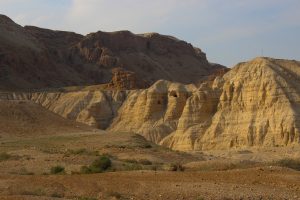Recalling Moses’ last words to the children of Israel, Isaiah calls heaven and earth to be his witness as he begins his message.[1] Like Moses, Isaiah pleads with Israel to relate to God as the one who created and cares for them. He highlights their inability to follow simple instructions and warns of the painful consequences that will result from disobedience.
Isaiah 1:1
1 The vision of Isaiah (Yishayahu יְשַׁעְיָהוּ) the son of Amoz, which he saw concerning Judah and Jerusalem in the days of Uzziah, Jotham, Ahaz, and Hezekiah, kings of Judah.
Hebrew names are intrinsically connected with their bearer’s character and destiny. The name, Isaiah, gives us spiritual insight into the prophet’s purpose and is the first key to begin to unlock his prophetic message. Isaiah (Yishayahu יְשַׁעְיָהוּ) is a compound name formed from the Hebrew word for salvation (Yeshua ישוע) and the most holy name of God, usually referred to as the Tetragrammaton: four written consonants in Hebrew יהוה (YHWH or Yahweh) which most Jews refrain from pronouncing and instead substitute ADONAI (LORD) or HaShem (the Name). The name Isaiah (Yishayahu יְשַׁעְיָהוּ) combines these two parts to give the meaning: the salvation of Yahweh.
Isaiah receives the Lord’s salvation messages in both visual and auditory forms designated for a specific audience. Since the beginning of God’s interactions with humanity, he has been personally speaking with individuals. He dialogued with Adam and Eve without the use of an intermediary, and the Torah records other incidents of God speaking directly with Cain, Noah, Abraham, Moses and Aaron. God himself called Abraham a prophet;[2] he heard and received visions from the Lord that provided him with divine knowledge, understanding and wisdom. The Lord continued using these same two patterns of communication to convey guidance to Isaac and Jacob, Abraham’s son and grandson. Jacob, whose name was changed to Israel, became the father of the 12 tribes of Israel. Isaiah was called to hear and see God’s messages of salvation, so he can announce them specifically to the Kingdom of Judah.
But why does Judah need salvation?
Comprised of two tribes—Judah and Benjamin—the kingdom of Judah had separated from the remaining tribes of Israel in 931 BC. Isaiah delivered God’s messages almost two centuries later during the reign of four kings, who led Judah over a period of about 90 years. During that time, Judah struggled to follow God’s guidance consistently. God’s message through Isaiah addresses this inner struggle to hear and obey.
[1] Deuteronomy 32:1
[2] Genesis 20:6-7




